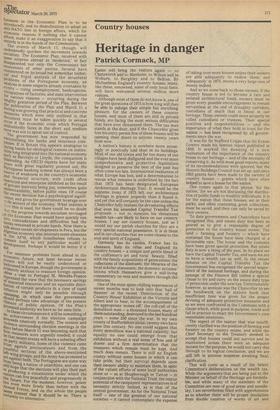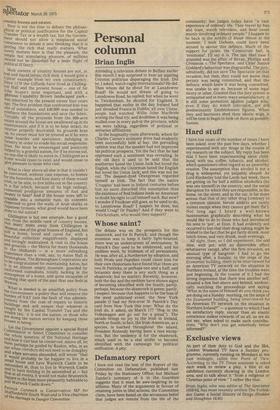Country houses
Heritage in danger
Patrick Cormack, MP
Easter will bring the visitors again — to Chatsworth and to Blenheim, to Wilton and to
Woburn, to Burghley and to Belton. By Michaelmas England's country houses, many, • like these, renowned, some of only local fame, will have welcomed several million more
visitors, ____•
Although most of them do not,know it, one of the great questions of 1975 is how long will they be able to indulge their simple but enriching pleasure, for the owners of these country houses, and most of them are still in private hands, are facing the most serious difficulties that have ever threatened them. The tax man stands at the door, and if the Chancellor gives him his entry permit few of these houses will be opening their doors to anyone twenty years from now.
A nation's history is nowhere more arrestingly or poetically told than in its buildings. Most of our old towns and far too many of our villages have been disfigured and the ever more comprehensive and protective legislation designed to preserve the best of the past has often come too late. International realisation of what Europe has lost, and a determination to rescue what remains is underlined by the fact that 1975 has been designated European Architectural Heritage Year. It would be the supreme irony if 1975 left our architectural heritage in greater jeopardy than it found it, and yet this will certainly be the case unless the Chancellor fully realises the devastating effects that even his amended Capital Transfer Tax proposals not to mention his threatened wealth tax—are likely to have on our country houses. I say our country houses, just as I would say our parish churches for they are a very special national possession. It is in them and in our churches that we come closest to the soul and spirit of England.
. Germany has its castles, France has its chateaux. Italy its villas and England its country houses a unique and gentle blend of the craftsman's art and rural beauty, filled with the family acquisitions of generations: the collections of the dilettanti; the libraries of the local scholar-statesmen; the domestic accumu! lations which themselves give a still-living commentary on men and manners through the centuries.
One of the most spine-chilling experiences of recent months was to look into that 'hall of disaster' at the recent 'Destruction of the Country House' Exhibition at the Victoria and Albert and to hear, to the accompaniment of the appropriate 'noises off,' the roll-call of the demolition men a thousand houses, many of .them outstanding, destroyed in the last hundred years some 250 since the war. In my own county of Staffordshire alone, twenty-two have gone this century. No one could suggest that every demolition was a national calamity, but equally no one could emerge from that exhibition without a real sense of loss and of shame and a firm determination that the treasures which remain must be kept. And much does remain. There is still no English county without some houses in which it can take pride, but their survival depends upon their owners' ability to maintain them. In spite
of the valiant efforts of some local authorities alone or as at Shugborough or Tatton in conjunction with the National Trust, the rescue potential of the ratepayers' representatives is of necessity strictly limited, as is that of the central government. As for the National Trust itself one of the greatest of our national societies it cannot contemplate the expense of taking over more houses unless their owners are able adequately to endow them, and 'adequately' in 1975, means a very large sum of money indeed.
And so we come back to those owners. If the country house is not to become a rare and isolated architectural fossil, owners must be given every possible encouragement to remain servantless at the end of draughty corridors, custodians of much that is finest in our heritage. These owners could more properly be called custodians or trustees. Their special position and responsibilities and the importance of what they hold in trust for the nation — has been recognised by all governments since the war.
It was for Sir Stafford Cripps that Sir Ernest Gowers made his famous report published in 1950. It marked the dawning of a new realisation of the importance of the country house to our heritage and of the necessity of conserving it. As with most good reports, many of its recommendations were ignored, but the Historic Buildings Council was set up, and since 1953 grants have been made to the owners of country houses grants which have often helped to save a house for the nation.
One comes again to that phrase 'for the nation,' for we are not discussing the distribution of public funds to wealthy individuals. It is for the nation that these houses, set in their parks, and often containing great collections, must be saved, and they can only be saved by their owners.
To date governments and Chancellors have recognised this, and estate duty has been so geared as to give a reasonable degree of protection to the country house owner. The land farming and forestry which have sustained the house have been charged at a favourable rate. The house and the contents have been given special protection. But estate duty is now a thing of the past. In its place we have the Capital Transfer Tax, and soon we are to have a wealth tax as well. In the recent debates on the Capital Transfer Tax the Government has recognised the special importance of the national heritage, and during the passage of the Finance Bill tabled a special clause to try and carry on the estate duty type of protection under the new tax. Unfortunately however, so anxious was the Chancellor to see his handiwork on the statute book that insufficient time was given for the proper devising of adequate protective measures and so we were confronted in the Commons with a clause which, while good in purpose, could well fail in practice to enact the Government's own reasonable intentions.
The aspect of the matter that was insufficiently clarified was the position of farming and forestry on the country estate, and while the ,Chief Secretary to the Treasury seemed to accept that houses could not survive and be maintained unless there were an adequate income for the purpose, he would not carry this through to its logical conclusion, and we are still left in anxious suspense awaiting final, clarification.
That will come as a result of the Select Committee's deliberations on the wealth tax. While the arguments that are being put to the Minister on behalf of the Heritage are formidable, and while many of the members of the Committee are men of good sense and sensibility, I am nevertheless filled with apprehension as to whether there will be proper insulation from double taxation of works of art and
country houses and estates.
Now is not the time to debate the philosophical or political justification for the Capital Transfer Tax or a wealth tax, but the Government should not allow a misplaced social conscience to delude it into thinking that it is getting the rich that really matters. What surely matters here is that the pleasure, the simple but stimulating pleasure, of millions Should not be disturbed for a mere flight of Political ill fancy.
Most owners of country houses are not, in real and liquid terms, rich men. I would give a typical example from my own constituency. Since 1178 the Giffards have lived at Chilling tun Hall and the present house — one of Sir John Soane's most important, and with a
glorious Capability Brown landscaped park—
was inherited by the present owner four years ago. The first problem that confronted him was one of subsidence, and £40,000 was needed to
reinforce the foundations and save the fabric. Virtually all the proceeds from the 800-acre
estate around the house are swallowed up in its maintenance, and if it is to be kept intact, its interior properly decorated, its grounds kept up, its ovvner must not be treated as if he were some hoarder and speculator, indulging in forestry in order to evade his social responsibi lities. He must be encouraged and positively helped by a grateful nation, for if he moves out, no one else is likely to move in. Chillington as a home would cease to exist, and would cease to give pleasure to those who visit.
What is clear above all else is that it couldn't be converted, without vast expense, to homes for the homeless, and how many of them would wish, or be able, to live miles out in the country in a flat which, because of its high ceilings, consumed prodigious amounts of fuel and money to heat? And if the house were left to crumble into a romantic ruin, its contents
dispersed to gave the walls of Arab sheiks or JaPanese tycoons, what good would have been one to the nation?
Chillington is but one example, but a good one, from the middle rank of country houses.
Not many miles away from Chillington is
Weston, one of the great houses of England, but ill a home, loved and cared for, with a beautiful collection magnificently displayed
and lovingly maintained. A visit to the house
rid grounds — the Mecca for many thousands in the Midlands — is a more refreshing perience than a visit, say, to Aston Hall in Birmingham. The Birmingham Corporation are
to be congratulated for maintaining Aston, but It is an almost empty museum, guarded by uniformed custodians, totally lacking in the
atmosphere of a home, and quite incapable of evoking that spirit of the past that one feels at Weston.
What is needed is an unselfish policy from that
Government: a policy that will remove the ourden of VAT (not the fault of this adminis tration) from the cost of repairs to historic
buildings and will ensure that whoever is caught by the Capital Transfer Tax and the
wealth tax, it is not the nation, or those who .are doing the nation service by keeping these houses in being.
Let the Government appoint a special Royal k-.0mmission or Select Committee to consider
the whole question of the National Heritage
how it can best be conserved. Above all, let t_tiem perhaps be guided by Ruskin, who, in an
age when corridors did not need to be draughty and when servants abounded, still wrote "that it would probably be far happier to live in a
small house and have Warwick Castle to be
astonished at, than to live in Warwick Castle and to have nothing to be astonished at — but that at all events, it would not make Brunswick square in the least more pleasantly habitable to pull Warwick Castle down." Patrick Cormach is Conservative MP for .taffordshire South West and is Vice-chairman of the Heritage in Danger Committee



































 Previous page
Previous page